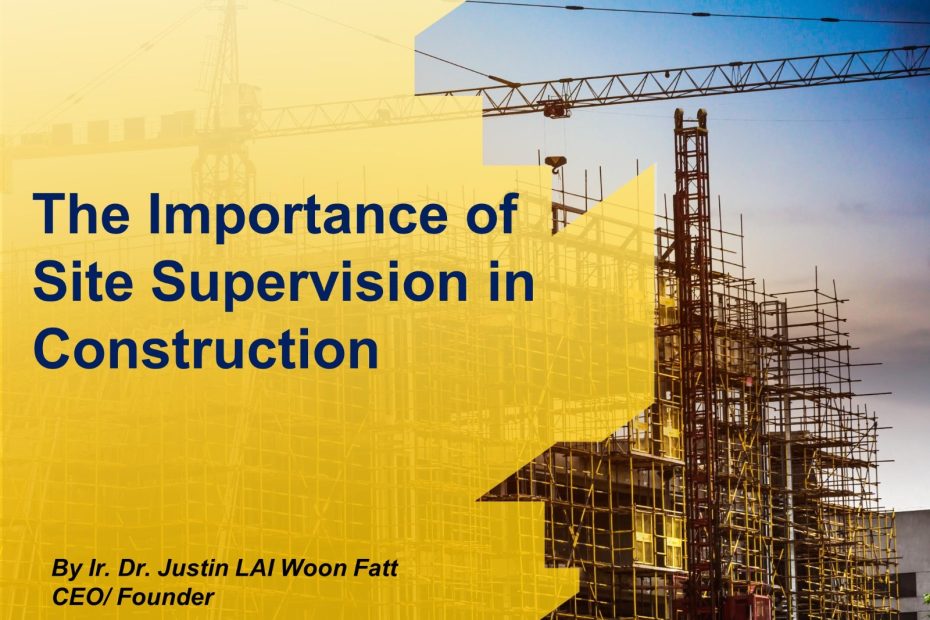Author: Ir. Dr. Justin LAI Woon Fatt | 27 February, 2023
INTRODUCTION
The construction industry is notoriously dangerous due to its work nature which includes working at height, frequent usage of different tools and heavy machinery, dealing with hazardous building materials, etc. The need for site supervision becomes understandable if we consider these threats. Site supervision is the process of monitoring and supervising all the construction activities at the site to ensure all construction practices are followed and the legal regulations and standards are enforced. Site supervision plays a vital role in minimizing construction accidents and effectively managing project progress.
The resident architect and engineer, site engineer, and Inspector of Works (IOW) are people involved in site supervision. The role of IOW is to ensure that the structural, mechanical, and electrical aspects of building construction are carried out in conformance with the plans, specifications, and required standards. Both the resident architect and resident engineer have the same responsibilities, which are to update the client regularly on the progress of the project in terms of time, cost, and quality. The only difference is that the resident architect takes care of the architectural elements while the resident engineer takes care of the engineering elements. The role of site engineer is almost similar to IOW, but at the same time, they are responsible for dealing with site changes and attending site meetings.
IMPORTANCE OF SITE SUPERVISION
- Efficiency and productivity
Efficiency and productivity are essential for a project to be completed on time as any delay in construction progress can create a massive direct or indirect cost. Site supervisors are responsible for evaluating the workers’ performances and giving clear instructions so that the workers know exactly what to do in their respective positions. Site supervisors must keep track of the construction progress. For example, Gantt chart or other digital supervision tools are used to record all phases of the projects and for daily delay tracking purposes. Moreover, construction projects are labour intensive, and some construction companies engage inexperienced or unskilled workers due to labour shortages or to save costs. Therefore, extra coordination and supervision need to be given. For instance, site supervisors can provide training to increase the productivity and performance of the workers. Good supervision with mutual respect and personal trust between supervisors and workers is believed to be able to create a highly productive and efficient working environment which can lead to enhanced service delivery. - Quality control
Quality control entails ensuring adherence to the original design and planning decision, which is part of the work scope of the site supervisors. Well-trained site supervisors guarantee the materials, equipment, and system used are of good quality and conform to the standards. Moreover, continuous monitoring of construction progress and quality of work by site supervisors can ensure that the efforts made by workers meet the desired quality. At the same time, it ensures that appropriate construction materials are used in compliance with applicable technical requirements to establish a high-quality construction outcome. Also, it assures success in completing site activities right the first time. All possible defects that could accumulate and escalate during the construction period can be minimised or prevented. - Budget control
Budget control is done concurrently when managing the schedule and work. This is to ensure the cost of the project stays within the budget throughout the whole project. Site supervisors can help in ensuring the project’s expenditure is within budget by strictly inspecting the materials and workmanship throughout the construction process. This means that site supervisors should be aware of the prices and cost levels. A good site supervisor will prepare detailed daily reports on what is happening at the construction site and provide continuous updates to the project manager. In this way, any costs that are starting to get out of control or potential disruption in the construction schedule can be spotted, and actions can be taken timely to mitigate the issues. - Legal aspect
Apart from looking after the safety of the construction site, site supervisors also take care of the legal aspects. There are many legal requirements and acts that set standards for supervision and clarify what protocol to be followed and what safety processes must be in place. For example, there are Occupational Safety and Health Act 1994 (OSHA) and the Factories and Machinery Act 1967 (FMA), both are enforced by the Department of Occupational Safety and Health (DOSH). Site supervisors must be familiar with the relevant legal requirements, processes, and procedures. It is their responsibility to oversee the construction site situations during site inspection to ensure that the project meets all the requirements so that the client would not have to deal with any issues with the authority afterward. - Safety Measures
Regardless of the scale of the construction site, there are possibilities for risks and injuries. While prevention is better than cure, site supervisors will have to enforce site safety procedures to minimize work-related injuries or accidents. For instance, ensuring everyone at the site is wearing Personal Protective Equipment (PPE) such as a safety helmet, safety boots, high-visibility vest, and gloves for safety purposes. Also, they should be equipped with knowledge on how to handle site accidents in accordance with established accident protocol. Depending on the location of the site and the work to be done, some sections may need more supervision than others. For example, more supervision should be given in a high-risk area as compared to a low-risk area.
- Efficiency and productivity
CONCLUSION
In conclusion, site supervision is a highly complex job that requires extensive knowledge and skills. Site supervisors play a significant role in helping the project stay on budget, reduce risk and accidents, and increase efficiency and productivity. Additionally, construction supervision must be geared towards ensuring high quality work without neglecting the legal aspects. When construction sites are supervised properly in compliance with legal requirements, it is believed that all mistakes can be averted before they could develop into bumps and vacuums. This is to establish a safe and healthy working environment that can ensure that the project deliverables can be achieved at each planning stage.
Ir. Dr. Justin LAI Woon Fatt
CEO/ Founder
IPM Group

